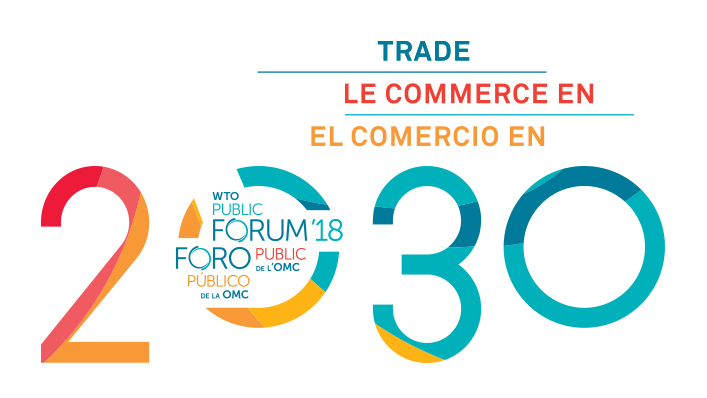Sustainable technology-enabled trade and a more inclusive trading system: Small state, ACP States, LDC and SSA perspective
12 Oct 2018 02:00h
Event report
The session was moderated by Mr Felix Maonera (Deputy Head at the African, Caribbean and Pacific Group (ACP) Geneva Office) who started by explaining that the session will focus on the impact of technology on production and trade in small states, least developed countries (LDCs) and ACP countries. He stated that technology has the power to bring global and local markets together, and that innovation is an important resource for increasing production in the manufacturing sector. He also highlighted that for such states, transferring technology does not simply mean exporting or importing specific technologies, rather, it should mean building local capacity for efficient use and development of the technology.
Mr Andrew Staines (Ambassador and Deputy Permanent Representative of the United Kingdom Mission to the UN and Other International Organizations in Geneva) explained that the UK is making efforts in ensuring that small states can participate meaningfully in digital commerce. He explained that the recently-launched UK development plan also considers new forms of trade, including the digital economy. He further illustrated the UK Mission’s efforts towards aiding LDCs: the UK supports capacity-building programmes such as DiploFoundation’s course on digital commerce, targeting Geneva-based diplomats from LDCs. Moreover, the UK has supported the launch of the Commonwealth Standards Network, namely a platform for Commonwealth countries to exchange ideas, share best practices and impart knowledge, aiming to facilitate trade and foster innovation across the Commonwealth through the increased use of international standards. He concluded by saying that the UK also supports other programmes aiming to link trade and development (i.e. ‘how to do development in a digital world’), to promote digital commerce as a key player in curbing the digital divide, and to promote financial inclusion.
Mr Frank Van Rompaey (Head of the UNIDO Office in Geneva, United Nations Development Organisation (UNIDO)) first considered that industrialisation is a priority for LDCs as a way to add value to communities and start participating in digital trade. He maintained that the main focus of LDCs should still remain on the manufacturing sector which, compared to the service sector, is the actual source of technological development. He explained that the ‘Industrial Revolution 3.0’ has already started; however, in LDCs this process has still not been fully accomplished. Technology has the power to allow global value chains to emerge. The outcome of the revolution is that labour costs are expected to rise and hence force labour-intensive industries to relocate to LDCs. He then maintained that we cannot yet speak of the ‘Industrial Revolution 4.0’ because this process has still not affected production chains. He concluded by affirming that the opportunities and risks of the digitalisation of the economy largely depend on the type of the industry under consideration. For labour-intensive industries, the impact will not be as drastic as some commentators ventilate. He explained that there is still a clear window of opportunity for LDCs within the 2030 development agenda, especially if they focus on the manufacturing sector. In order for ‘Industry 4.0’ to develop, cyber production systems, a high-level of energy supply and well-integrated systems are needed. LDCs do not have those factors yet and their economies need to transform structurally first.
Ms Marilia Maciel (Digital Policy Senior Researcher at DiploFoundation) considered that LDCs need to put policies in place in order to participate in the digital economy. At the same time, she said that LDCs need capacity-building programmes to allow them to also take part in policy discussions at the multilateral level.
She explained that DiploFoundation’s mission is to analyse, map, decrypt, and build information and knowledge around what is discussed in the ‘very scattered policy debate in Geneva’. She maintained that most of the sessions addressing capacity building at the WTO Public Forum target mainly small and medium enterprises (SMEs). However, she stressed the importance of not forgetting the policymakers, ‘those who develop the relevant policies for those who are on the ground’.
She then considered the three main challenges regarding capacity-development programmes for policy-makers:
-
First, there is an increasing intersection between digital and trade policies. Such an intersection was also present in the past (e.g. considering issues such as online consumer protection and privacy); however, the volume and the breadth of these issues are unprecedented. Moreover, such an intersection is not a language shift but a knowledge one: most of the regional trade agreements already have a clear digital component. And even if some countries are not part of such agreements, they are of importance to them as ‘when they want to be part of it in a later stage, the framework will have been already discussed for them’.
-
Second, there is doubt over if and how to engage in such negotiations. Negotiators will need to take their decisions based on facts, on the knowledge of the matter at stake. If we are talking about the digital economy, this entails a basic understanding on how the Internet works, its infrastructure, and the actors involved.
-
Third, trade negotiators need to find a point of common dialogue considered to be the existing asymmetries in digital development. Companies that are data intensive (e.g. Apple) have a budget that is higher than the economies of four LDCs together. She concluded by stating that this is precisely where capacity building comes into the picture. In the Digital Commerce course developed by DiploFoundation, the approach taken was factual, policy-based, and multidisciplinary as it comprised legal, policy and technical discussions.
Related event

